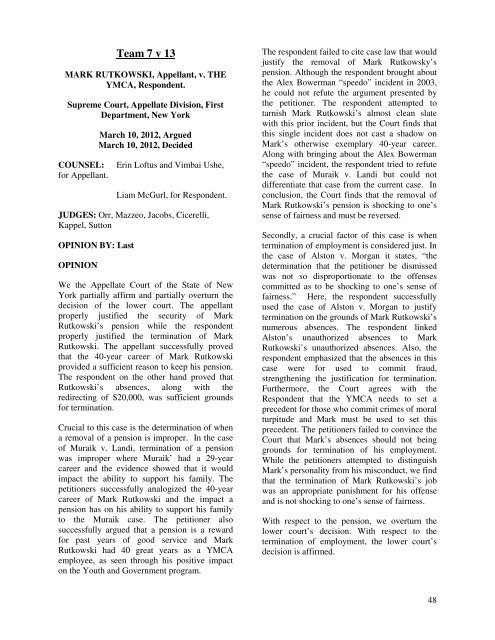2012 Conference Executive Record Report.pdf - YMCA of Greater ...
2012 Conference Executive Record Report.pdf - YMCA of Greater ...
2012 Conference Executive Record Report.pdf - YMCA of Greater ...
Create successful ePaper yourself
Turn your PDF publications into a flip-book with our unique Google optimized e-Paper software.
Team 7 v 13<br />
MARK RUTKOWSKI, Appellant, v. THE<br />
<strong>YMCA</strong>, Respondent.<br />
Supreme Court, Appellate Division, First<br />
Department, New York<br />
COUNSEL:<br />
for Appellant.<br />
March 10, <strong>2012</strong>, Argued<br />
March 10, <strong>2012</strong>, Decided<br />
Erin L<strong>of</strong>tus and Vimbai Ushe,<br />
Liam McGurl, for Respondent.<br />
JUDGES: Orr, Mazzeo, Jacobs, Cicerelli,<br />
Kappel, Sutton<br />
OPINION BY: Last<br />
OPINION<br />
We the Appellate Court <strong>of</strong> the State <strong>of</strong> New<br />
York partially affirm and partially overturn the<br />
decision <strong>of</strong> the lower court. The appellant<br />
properly justified the security <strong>of</strong> Mark<br />
Rutkowski’s pension while the respondent<br />
properly justified the termination <strong>of</strong> Mark<br />
Rutkowski. The appellant successfully proved<br />
that the 40-year career <strong>of</strong> Mark Rutkowski<br />
provided a sufficient reason to keep his pension.<br />
The respondent on the other hand proved that<br />
Rutkowski’s absences, along with the<br />
redirecting <strong>of</strong> $20,000, was sufficient grounds<br />
for termination.<br />
Crucial to this case is the determination <strong>of</strong> when<br />
a removal <strong>of</strong> a pension is improper. In the case<br />
<strong>of</strong> Muraik v. Landi, termination <strong>of</strong> a pension<br />
was improper where Muraik’ had a 29-year<br />
career and the evidence showed that it would<br />
impact the ability to support his family. The<br />
petitioners successfully analogized the 40-year<br />
career <strong>of</strong> Mark Rutkowski and the impact a<br />
pension has on his ability to support his family<br />
to the Muraik case. The petitioner also<br />
successfully argued that a pension is a reward<br />
for past years <strong>of</strong> good service and Mark<br />
Rutkowski had 40 great years as a <strong>YMCA</strong><br />
employee, as seen through his positive impact<br />
on the Youth and Government program.<br />
The respondent failed to cite case law that would<br />
justify the removal <strong>of</strong> Mark Rutkowsky’s<br />
pension. Although the respondent brought about<br />
the Alex Bowerman “speedo” incident in 2003,<br />
he could not refute the argument presented by<br />
the petitioner. The respondent attempted to<br />
tarnish Mark Rutkowski’s almost clean slate<br />
with this prior incident, but the Court finds that<br />
this single incident does not cast a shadow on<br />
Mark’s otherwise exemplary 40-year career.<br />
Along with bringing about the Alex Bowerman<br />
“speedo” incident, the respondent tried to refute<br />
the case <strong>of</strong> Muraik v. Landi but could not<br />
differentiate that case from the current case. In<br />
conclusion, the Court finds that the removal <strong>of</strong><br />
Mark Rutkowski’s pension is shocking to one’s<br />
sense <strong>of</strong> fairness and must be reversed.<br />
Secondly, a crucial factor <strong>of</strong> this case is when<br />
termination <strong>of</strong> employment is considered just. In<br />
the case <strong>of</strong> Alston v. Morgan it states, “the<br />
determination that the petitioner be dismissed<br />
was not so disproportionate to the <strong>of</strong>fenses<br />
committed as to be shocking to one’s sense <strong>of</strong><br />
fairness.” Here, the respondent successfully<br />
used the case <strong>of</strong> Alston v. Morgan to justify<br />
termination on the grounds <strong>of</strong> Mark Rutkowski’s<br />
numerous absences. The respondent linked<br />
Alston’s unauthorized absences to Mark<br />
Rutkowski’s unauthorized absences. Also, the<br />
respondent emphasized that the absences in this<br />
case were for used to commit fraud,<br />
strengthening the justification for termination.<br />
Furthermore, the Court agrees with the<br />
Respondent that the <strong>YMCA</strong> needs to set a<br />
precedent for those who commit crimes <strong>of</strong> moral<br />
turpitude and Mark must be used to set this<br />
precedent. The petitioners failed to convince the<br />
Court that Mark’s absences should not being<br />
grounds for termination <strong>of</strong> his employment.<br />
While the petitioners attempted to distinguish<br />
Mark’s personality from his misconduct, we find<br />
that the termination <strong>of</strong> Mark Rutkowski’s job<br />
was an appropriate punishment for his <strong>of</strong>fense<br />
and is not shocking to one’s sense <strong>of</strong> fairness.<br />
With respect to the pension, we overturn the<br />
lower court’s decision. With respect to the<br />
termination <strong>of</strong> employment, the lower court’s<br />
decision is affirmed.<br />
48
















